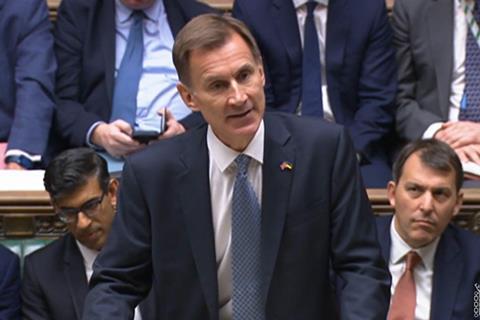The cash-strapped Ministry of Justice faces a real-terms spending cut next year, HM Treasury has revealed following today's autumn statement.
The MoJ's day-to-day spending budget, £9.4bn for 2022/23 will rise by 4% in 2023/24 to £9.8bn. The following year will see the budget rise by just 2% to £10bn.
The Office for Budget Responsibility predicts an inflation rate of 7.4% next year. Lawyers' leaders, who this week called for recognition of justice as a key public service, condemned the cuts.

However the capital budget will rise by 35% in 2023/24 to £2.3bn before falling in 2024/25 to £1.5bn. The latter figure is less than capital spending is forecast to be this year (£1.7bn).
Justice was one of the worst-hit victims of post-2008 crash austerity, with its overall budget plunging 25% in real terms between 2010-11 and 2019-20.
According to the chancellor, 'government departments will continue to identify efficiency savings in day-today budgets'. A government 'efficiency and savings review' will include reprioritising spending away from lower-value and low-priority programmes, and reviewing the effectiveness of public bodies. The government will report on progress in the spring.
Elsewhere, in a plan for 'stability, growth and public services', the chancellor revealed that to boost the housing market, stamp duty land tax concessions would remain in place until 31 March 2025. The government will amend the Stamp Duty Land Tax (Reduction) Bill to implement this measure.
Treasury documents also restate the government's ambition to reform retained EU law. 'As part of this programme, the government will move rapidly to review retained EU law in key growth industries - including digital technology, life sciences, green industries, financial services, and advanced manufacturing - to identify changes that can be made over the next year which have the greatest potential to unlock growth.'
Law firm finance specialist Peter Noyce of accountant Menzies commented: 'The budget will affect law firms as regards the tweaks around the edges in respect of freezing personal allowances and the reduction in the threshold at which point the highest rate of income tax is paid (if people are lucky to be above that bracket).
'The chancellor has tried to at least give the impression that he is in control and bringing stability back, which if that is achieved means that we are all in an arena that will perhaps not be quite so uncertain over the next couple of years or so; whilst not pretending there will not be bumps in the road. We are in a “Russian made recession” after all.'
Noyce added that areas within legal practices would suffer dips amid a general lack of economic confidence. 'That said, each and every business, not just law firms, should be operating within known sensitivities i.e. they should know what their own break-even position is or the level of turnover is across departments and as a firm as a whole. That can mean they are making the necessary profit and generating the amount of cash that they need to operate and hopefully progress as a business.'
Bar chair Mark Fenhalls KC said: 'While the chancellor rightly recognises health and education as vital public services to be adequately funded, it is a mistake not to see justice in the same light. The cost of living crisis means those most in need are now even more likely to require access to justice for help with housing, employment, debt and other essential legal issues.
'The justice sector was one of the hardest hit by austerity cuts a decade ago and was only just beginning to rebuild. This real terms cut to justice funding could put us back at square one and that would be devastating for those most in need.'
In its response, the Society of Trusts and Estates Practitioners described the statement as a missed opportunity to reduce inheritance tax avoidance and reform an ineffective and an unfair system.
Emily Deane, technical counsel and head of government affairs, said: ‘‘STEP has long argued that the inheritance tax system is too complex, unfair and in dire need of reform.A low-rate tax with few reliefs and exemptions is far preferable than one with a high headline rate that those who can afford professional advice can avoid. However, instead of simplifying the system, which would still benefit the public purse, the government is essentially maintaining the status quo by freezing the nil-rate band.
‘It is incredibly disappointing that the government has frozen inheritance tax until 2028. Tinkering with rates and reliefs will do nothing to address the huge complexity many families face.'
This article is now closed for comment.





























7 Readers' comments